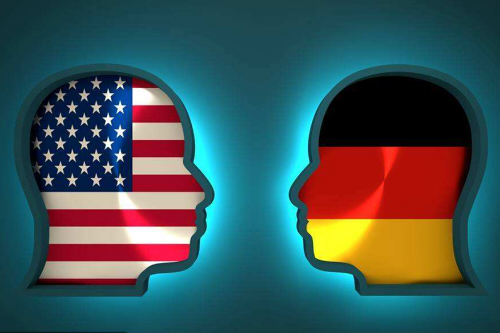The World Economy: The German Problem
世界经济:德国问题
Why Germany’s current-account surplus is bad for the world economy
为什么说德国经常账户盈余有害世界经济
The battle-lines are drawn. When the world’s big trading nations convene this week at a G20 summit in Hamburg, the stage is set for a clash between a protectionist America and a free-trading Germany.
战线已然拉开。本周全球各贸易大国在汉堡举行的G20峰会,正是倾向保护主义的美国和主张自由贸易的德国之间的角力场。
President Donald Trump has already pulled out of one trade pact, the Trans-Pacific Partnership, and demanded the renegotiation of another, the North American Free-Trade Agreement. He is weighing whether to impose tariffs on steel imports into America, a move that would almost certainly provoke retaliation. The threat of a trade war has hung over the Trump presidency since January. In contrast, Angela Merkel, Germany’s chancellor and the summit’s host, will bang the drum for free trade. In a thinly veiled attack on Mr. Trump, she delivered a speech on June 29th condemning the forces of protectionism and isolationism. An imminent free-trade deal between Japan and the European Union will add substance to her rhetoric.
特朗普已经退出了《跨太平洋伙伴关系协定》,并要求就另一个协定《北美自由贸易协定》重新进行谈判。他还权衡着是否要对美国进口的钢铁征收关税,此举势必会引发报复。自1月以来,贸易战的威胁一直笼罩着特朗普政府。而本次峰会的东道主——德国总理默克尔,将会为自由贸易擂鼓助威。她在1月29日发表演讲,谴责保护主义和孤立主义势力,这几乎是对特朗普毫不掩饰的攻击。日本和欧盟之间即将达成的自由贸易协定将为她的言辞提供实据。
There is no question who has the better of this argument. Mr. Trump’s doctrine that trade must be balanced to be fair is economically illiterate. His belief that tariffs will level the playing field is naive and dangerous: they would shrink prosperity for all. But in one respect, at least, Mr. Trump has grasped an inconvenient truth. He has admonished Germany for its trade surplus, which stood at almost $300bn last year, the world’s largest (China’s hoard was a mere $200bn). His threatened solution – to put a stop to sales of German cars – may be self-defeating, but the fact is that Germany saves too much and spends too little. And the size and persistence of Germany’s savings hoard makes it an awkward defender of free trade.
谁在争论中占上风是毫无疑问的。特朗普认为贸易必须平衡才算公平的说法显露出经济学上的无知。他认为关税能维持公平竞争的想法很幼稚,也很危险:高额关税会损害各方的繁荣。但至少在一个方面,特朗普抓住了一个令人感到窘迫的事实。德国的贸易顺差在去年几乎达到3000亿美元,为全球最高(中国仅为2000亿美元),特朗普为此向德国提出了告诫。他扬言要采取的解决办法是禁止德国汽车在美国销售,但也许会适得其反。然而德国确实是储蓄太多而花费太少。规模持续增加的德国储蓄令它在捍卫自由贸易时很是尴尬。

At bottom, a trade surplus is an excess of national saving over domestic investment. In Germany’s case, this is not the result of a mercantilist government policy, as some foreigners complain. Nor, as German officials often insist, does it reflect the urgent need for an ageing society to save more. The rate of household saving has been stable, if high, for years; the increase in national saving has come from firms and the government.
从根本上说,贸易顺差是国内储蓄超过国内投资的部分。就德国而言,贸易顺差并非如一些外国人控诉的那样,是重商主义政府政策的结果。也不像德国官方时常强调的那样,是由于老龄化社会迫切需要更多储蓄。德国家庭储蓄率虽高,但多年来一直保持稳定。国内储蓄的增长来自公司和政府。
Underlying Germany’s surplus is a decades-old accord between business and unions in favour of wage restraint to keep export industries competitive. Such moderation served Germany’s export-led economy well through its postwar recovery and beyond. It is an instinct that helps explain Germany’s transformation since the late 1990s from Europe’s sick man to today’s muscle-bound champion.
商界和工会之间达成了数十年之久的协议,通过抑制工资增长来保持出口工业的竞争力,从而支撑起了德国的顺差。这样的克制帮助德国出口导向的经济实现了战后的恢复,以及之后的发展,也揭示了德国如何从上世纪90年代时的“欧洲病人”变身如今的肌肉发达而僵硬的冠军选手。
There is much to envy in Germany’s model. Harmony between firms and workers has been one of the main reasons for the economy’s out-performance. Firms could invest free from the worry that unions would hold them to ransom. The state played its part by sponsoring a system of vocational training that is rightly admired. In America the prospects for men without college degrees have worsened along with a decline in manufacturing jobs – a cause of the economic nationalism espoused by Mr. Trump. Germany has not entirely escaped this, but it has held on to more of the sorts of blue-collar jobs that America grieves for. This is one reason why the populist AfD party remains on the fringes of German politics.
德国模式有很多令人艳羡的地方。和谐的劳资关系一直是该国经济表现出众的主要原因。公司可以放心投资,不必担忧工会的要挟。政府则是通过为本国备受推崇的职业培训体系提供资助而发挥作用。在美国,随着制造业工作岗位的流失,没有大学文凭的人前途已变得惨淡,这成为特朗普所支持的经济民族主义的一个起因。德国并没能完全避免这种情况,但它保有了更多的蓝领岗位,而这正是美国所痛失的。这也是民粹主义的德国另类选择党(AfD)在德国政治中处于边缘地位的一个原因。
But the adverse side-effects of the model are increasingly evident. It has left the German economy and global trade perilously unbalanced. Pay restraint means less domestic spending and fewer imports. Consumer spending has dropped to just 54% of GDP, compared with 69% in America and 65% in Britain. Exporters do not invest their windfall profits at home. And Germany is not alone; Sweden, Switzerland, Denmark and the Netherlands have been piling up big surpluses, too.
但是这种模式的不利副作用也渐渐明显。它让德国经济和全球贸易陷入危险的失衡状态。抑制工资意味着更低的国内消费和进口。德国的消费支出已经降至其GDP的54%,而美国的数字是69%,英国为65%。出口商不会把意外得来的高额利润投资于国内。不止德国如此,瑞典、瑞士、丹麦和荷兰也一直在积累巨额顺差。
For a large economy at full employment to run a current-account surplus in excess of 8% of GDP puts unreasonable strain on the global trading system. To offset such surpluses and sustain enough aggregate demand to keep people in work, the rest of the world must borrow and spend with equal abandon. In some countries, notably Italy, Greece and Spain, persistent deficits eventually led to crises. Their subsequent shift towards surplus came at a heavy cost. The enduring savings glut in northern Europe has made the adjustment needlessly painful. In the high-inflation 1970s and 1980s Germany’s penchant for high saving was a stabilising force. Now it is a drag on global growth and a target for protectionists such as Mr. Trump.
一个处于充分就业的大型经济体,其经常账户盈余却超过GDP的8%,这给全球贸易体系带来了过度的负担。为了抵消这些顺差,并保持足够的总需求来维持就业,世界其他国家必须以同等规模借债并支出。在有些国家,特别是意大利、希腊和西班牙,持续的赤字最终导致了危机。它们随后付出了沉重代价来转向保持顺差。北欧长期储蓄过剩,给调整平添了不必要的痛苦。在上世纪七八十年代的高通胀时期,德国保持高储蓄是一股稳定的力量,现在则拖累了全球增长,并成了特朗普等保护主义者攻击的目标。
下载:英文、中文版本








